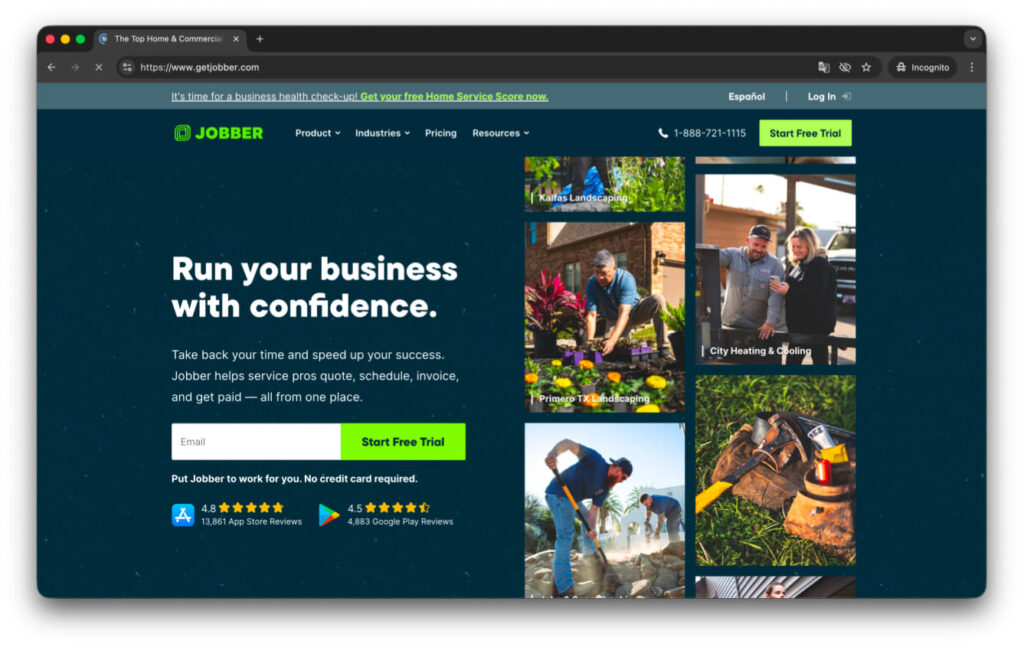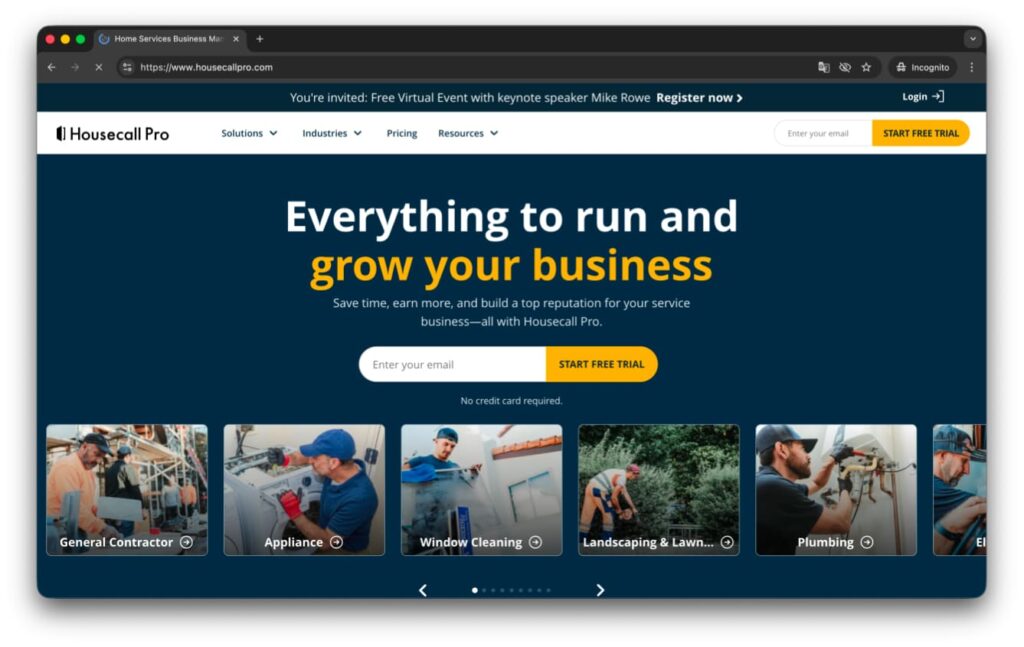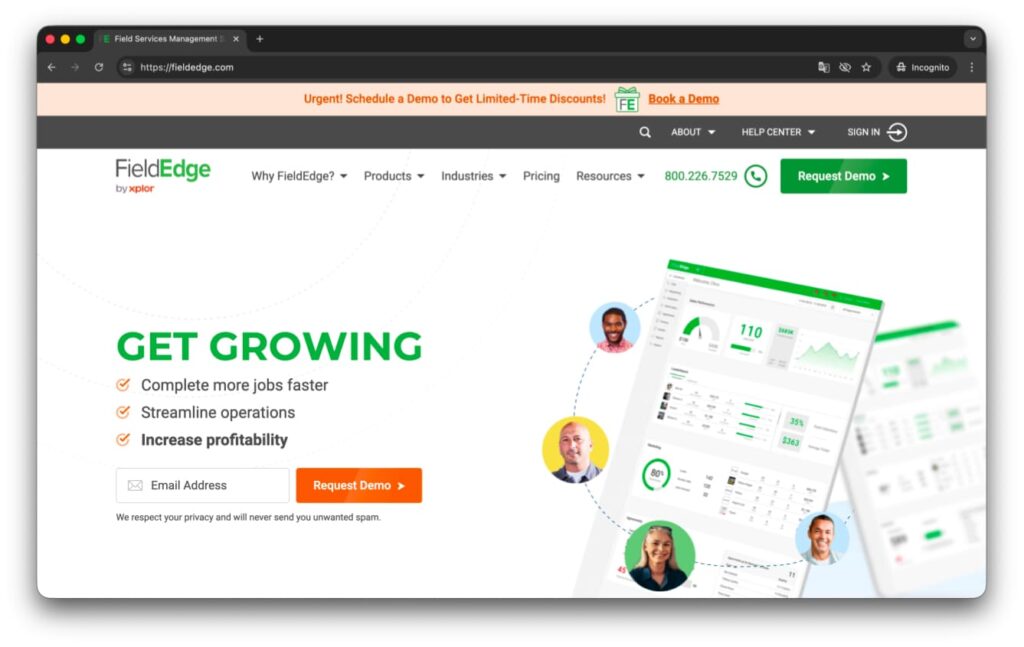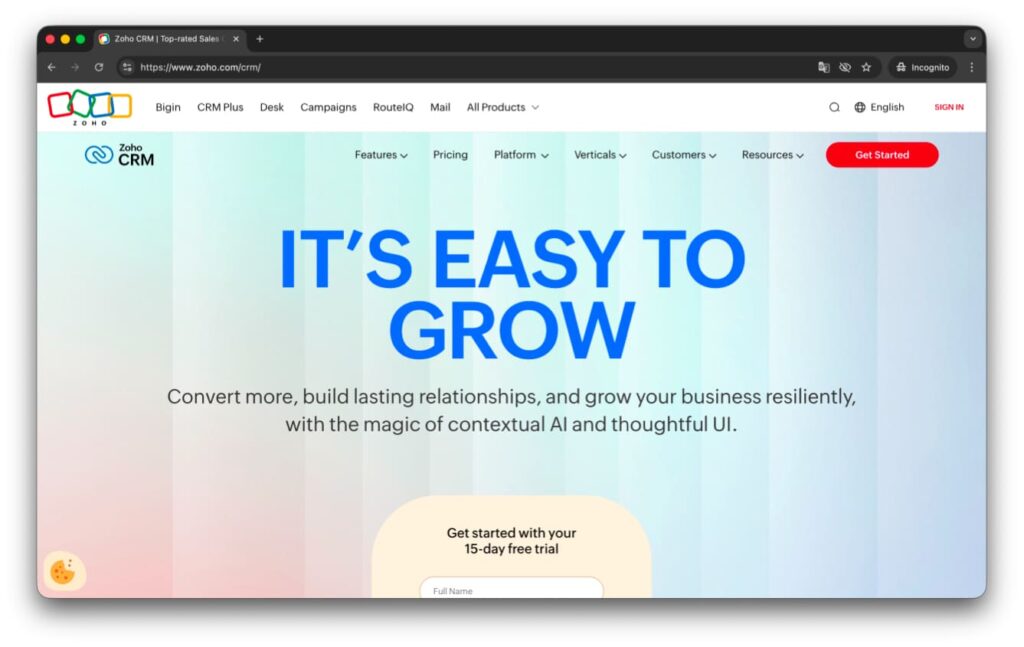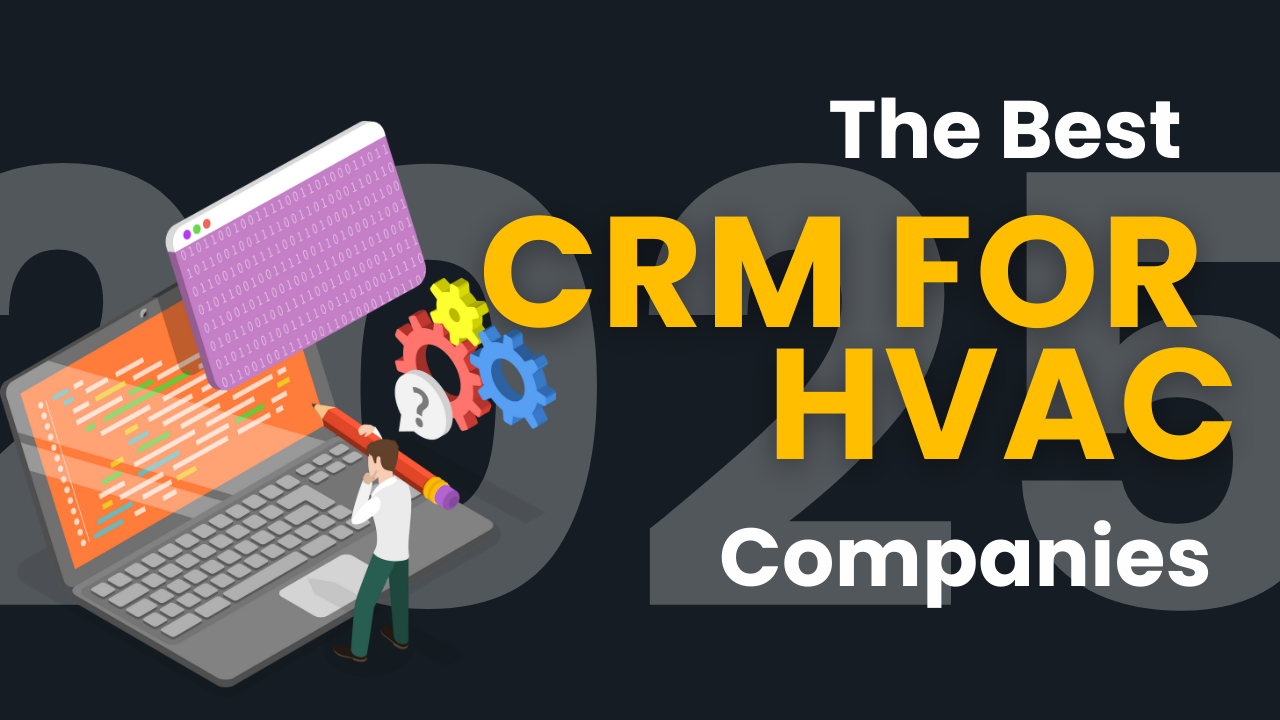
| Getting your Trinity Audio player ready... |
Managing an HVAC business doesn’t come easy. Between scheduling jobs, tracking invoices, keeping up with customer requests, and making sure technicians are where they need to be, things can get chaotic. To get things and track and organize them in the best way, HVAC CRM software can become a pretty handy tool for you.
The right CRM can turn that chaos into smooth operations, enabling you to manage customer relationships, database, and workflows while growing your business with ease.
But with so many options out there, how do you know which one is right for you?
We’ve done the research, sifted through countless reviews, and tested the best options to bring you the 10 best HVAC CRM software that will redefine how you run your business in 2025.

How We Evaluated HVAC CRM Software
Not all CRMs are the same, they are created for different purposes, tailored to different industries, and some promise the world but fall flat in delivering the results, while others quietly power some of the most successful HVAC businesses.
We have evaluated each CRM based on its real-world usability, the business impact that this software makes, and how well it addresses the unique needs a professional in HVAC may have.
Industry-Specific Features
A CRM for HVAC isn’t just about keeping customer contacts—it should be the backbone of your operations. We looked for features like automated dispatching, job tracking, equipment maintenance tracking, and invoicing. If a CRM wasn’t built with HVAC professionals in mind, it didn’t cut.
Integrations
Your CRM should play nicely with the tools you’re using. Be it accounting software, marketing automation, or inventory management systems, seamless integrations are key. The best HVAC CRM software should act as a central hub for your entire business.
User Experience
A CRM is supposed to make your life easier, not harder. We tested how intuitive each system is, how painless onboarding a team is, and whether technicians in the field can navigate the mobile app without frustration. Because let’s be honest—if your CRM is a headache, no one will use it.
Customer Support
When things go wrong, you need fast and reliable support. We analyzed how responsive each provider is, whether they offer 24/7 assistance, and if their support team actually understands the HVAC industry. Because waiting on hold when you have jobs to do isn’t an option.
Pricing
Great software does not have to break the bank. We compared costs across the board, from the very budget-friendly options for small businesses to enterprise-level solutions for major HVAC operations. No matter what your budget is, we found options that deliver value.
Scalability
Your CRM should grow with you. Whether you are a small HVAC contractor looking to expand or a multi-location enterprise, we made sure these CRMs can handle increased workloads and more complex operations.
Reporting and Analytics
Information is power. The best HVAC CRMs do not just collect information; they give you insights to optimize efficiency, track revenue, and improve customer satisfaction. We looked at reporting dashboards and analytics capabilities to see if they provide actionable insights.
Mobile Accessibility
HVAC technicians are not office-based; they go from job to job. For this reason, we tested each CRM’s mobile app to confirm that technicians could access job information, process invoices, and update customer records while on the road.
Reputation and Reviews
You don’t take a CRM provider’s word for it-you listen to the people using it. We parsed customer reviews, case studies, and industry feedback to make sure these CRMs have a pretty good track record.
The Top 10 HVAC CRM Software Solutions
We’ve managed to cut the noise to provide you with nothing but the cream of the best HVAC CRM software that will put your business running like a charm in 2025.
1. ServiceTitan
Key Features
- Advanced job scheduling and automated dispatching
- Integrated HVAC marketing solutions to attract more customers
- Robust reporting and analytics for data-driven decisions
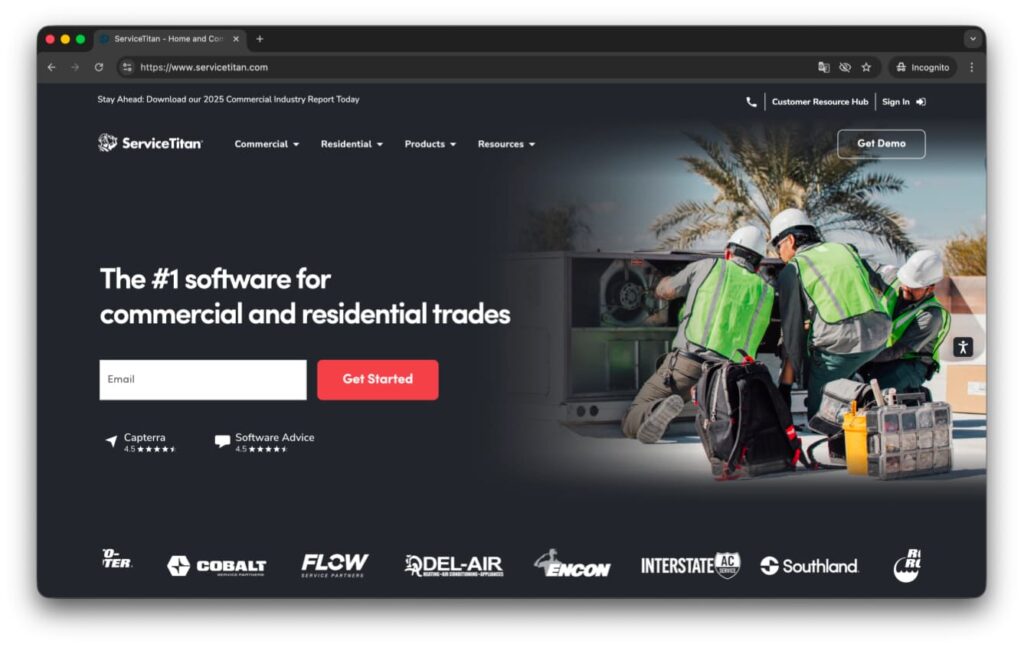
Pros
✅ Most advanced automation features in the industry
✅ Best mobile app for technicians
✅ Designed for large HVAC businesses wanting total control
Cons
❌ Higher price point compared to competitors
❌ Requires onboarding due to its advanced features
Pricing
Custom pricing depends on business size and needs.
Best For
Large HVAC companies looking for an all-in-one solution with powerful automation.
Website: https://www.servicetitan.com/
2. Jobber
Key Features
- Simple yet powerful scheduling and invoicing
- Client communication tools to keep customers informed
- Efficient quoting system for quick job estimates
Pros
✅ Extremely user-friendly interface
✅ Affordable for small and mid-sized businesses
✅ Strong customer support
Cons
❌ Limited advanced reporting features
❌ Fewer third-party integrations than larger competitors
Pricing
Starts at $49/month.
Best For
Small to mid-sized HVAC businesses that want an easy-to-use CRM without the complexity.
Website: https://www.getjobber.com/
3. Housecall Pro
Key Features
- Automated job scheduling to reduce administrative work
- Online booking system for customer convenience
- Text message reminders to minimize missed appointments
Pros
✅ Affordable option for small contractors
✅ Intuitive mobile app for technicians
✅ Helps improve customer communication
Cons
❌ Lacks some enterprise-level customization options
❌ Limited data reporting features
Pricing
Starts at $65/month.
Best For
Small HVAC contractors who need a simple, all-in-one CRM with strong mobile capabilities.
Website: https://www.housecallpro.com/
4. FieldEdge
Key Features
- Real-time dispatching ensures technicians are always in the right place at the right time.
- Complete customer history tracking lets you see past jobs, invoices, and equipment details in seconds.
- Seamless QuickBooks integration eliminates double data entry and simplifies accounting.
Pros
✅ Live job tracking gives managers complete visibility into field operations.
✅ Optimized route planning helps technicians save time and fuel costs.
✅ Strong reporting tools provide deep business insights.
Cons
❌ Higher learning curve for new users.
❌ Pricing can be steep for small businesses.
Pricing
Custom pricing based on business size and needs.
Best For
HVAC businesses that want deep insights, seamless accounting integration, and real-time job tracking to optimize operations.
Website: https://fieldedge.com/
5. ServiceTrade
Key Features
- An interactive customer portal allows clients to book services and track job progress.
- Photo and video documentation provides transparency and accountability on every job.
- Advanced reporting dashboards help HVAC business owners make data-driven decisions.
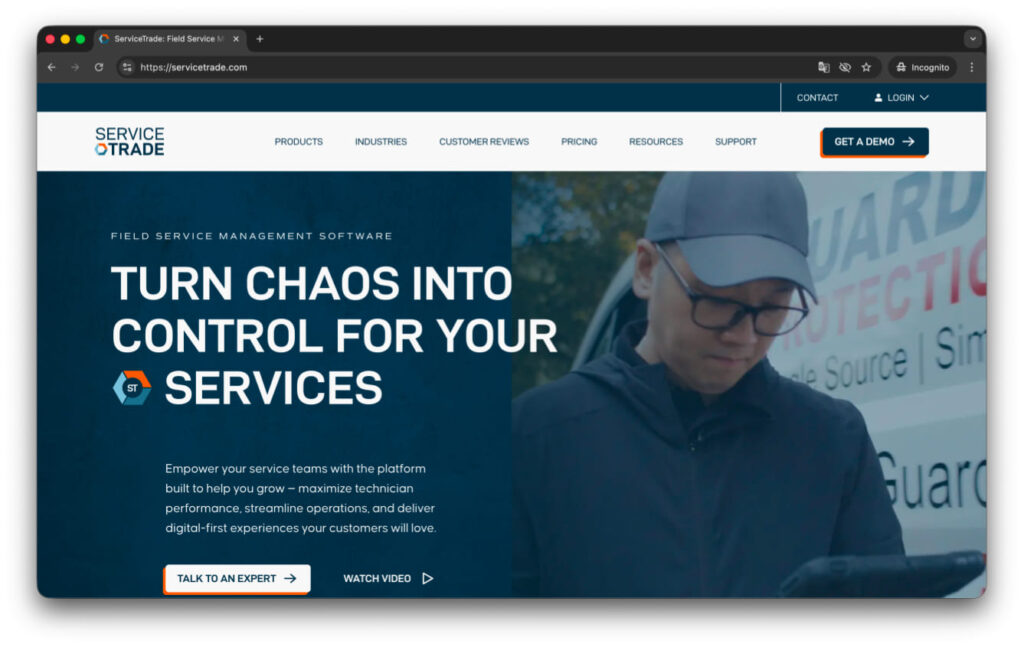
Pros
✅ Enhances customer trust with transparent service reports.
✅ Great for commercial HVAC companies that need strong documentation tools.
✅ Scalable CRM that grows with your business.
Cons
❌ More focused on commercial HVAC companies, may not be ideal for smaller residential contractors.
❌ Premium pricing compared to simpler solutions.
Pricing
Custom pricing based on business size and usage.
Best For
Commercial HVAC companies need detailed job documentation, customer transparency, and powerful reporting tools.
Website: https://servicetrade.com/
6. Successware
Key Features
- All-in-one business management suite includes CRM, accounting, and operations tools.
- Automated dispatching and scheduling improve efficiency for HVAC teams.
- Business coaching and insights help companies optimize operations and profitability.
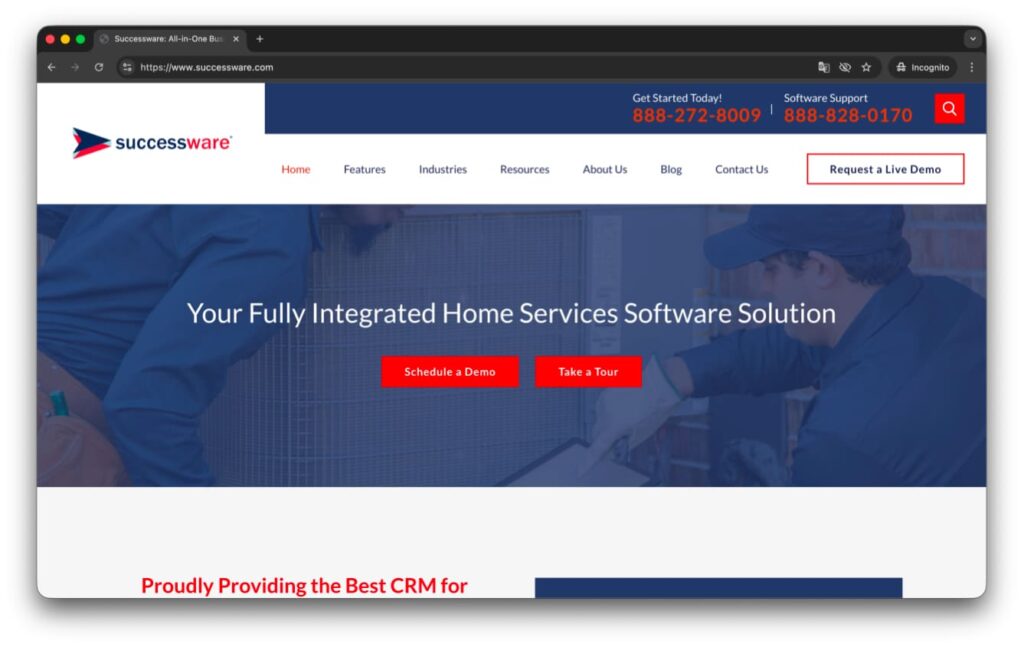
Pros
✅ Comprehensive business management beyond just CRM features.
✅ Excellent customer support with personalized guidance.
✅ Strong accounting and financial tracking tools.
Cons
❌ More complex setup compared to simpler CRMs.
❌ Best suited for mid-to-large businesses, maybe too much for small contractors.
Pricing
Custom pricing is available upon request.
Best For
Mid-to-large HVAC businesses looking for an all-in-one solution that includes accounting, CRM, and business coaching.
Website: https://www.successware.com/
7. Kickserv
Key Features
- Simple scheduling and dispatching to keep jobs organized.
- The customer self-service portal allows clients to book and manage appointments.
- Built-in invoicing and payment processing for faster transactions.
Pros
✅ User-friendly for small businesses and solo contractors.
✅ Affordable compared to enterprise CRM.
✅ Integrates with QuickBooks for accounting simplicity.
Cons
❌ Lacks some advanced automation features found in premium CRMs.
❌ Limited customization for large businesses.
Pricing
Starts at $59/month.
Best For
Small HVAC contractors who need an easy-to-use, affordable CRM with scheduling, invoicing, and customer management.
Website: https://www.kickserv.com/
8. Zoho CRM
Key Features
- AI-powered automation simplifies workflow and customer follow-ups.
- Email and SMS marketing tools to help HVAC companies stay connected with customers.
- Customizable CRM platform with strong third-party integrations.
Pros
✅ Highly customizable to fit any business size.
✅ Advanced automation reduces manual work.
✅ Affordable entry-level pricing for small businesses.
Cons
❌ Not HVAC-specific, so some features require a custom setup.
❌ More complex than plug-and-play solutions like Jobber.
Pricing
Starts at $14/month (basic plan).
Best For
HVAC companies that want a powerful, flexible CRM with automation and marketing tools.
Website: https://www.zoho.com/crm/
9. Nutshell
Key Features
- Pipeline automation helps HVAC businesses track leads and jobs.
- Clear dashboard provides a complete business overview.
- Seamless email integration improves communication with customers.
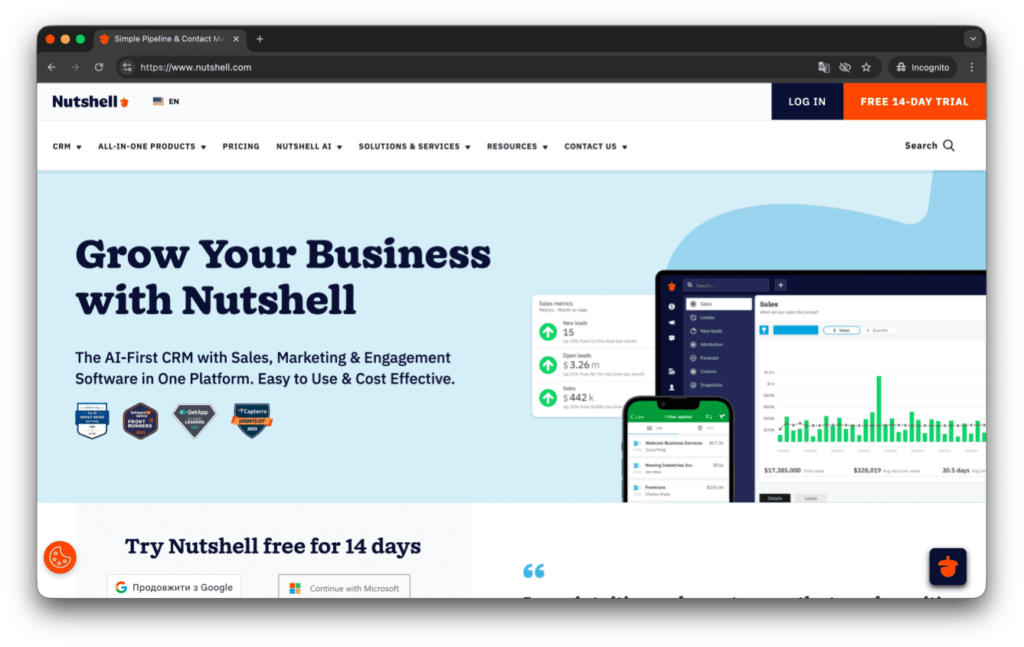
Pros
✅ Great for HVAC sales teams looking to manage leads.
✅ Affordable and simple for small businesses.
✅ Strong reporting and analytics for business growth.
Cons
❌ Lacks job scheduling and dispatching tools.
❌ Not as HVAC-specific as other CRMs on this list.
Pricing
Starts at $19/month per user.
Best For
HVAC businesses that focus heavily on sales and lead tracking rather than job dispatching.
Website: https://www.nutshell.com/
10. Freshsales
Key Features
- AI-driven lead scoring helps HVAC companies prioritize high-value clients.
- Email and call tracking provide real-time insights into customer interactions.
- Built-in invoicing and workflow automation make operations seamless.
Pros
✅ Great for growing HVAC businesses that want AI-powered tools.
✅ Affordable with strong free-tier options.
✅ Integrates well with other business tools.
Cons
❌ Requires customization for HVAC-specific needs.
❌ Lacks in-depth dispatching and job tracking.
Pricing
Free plans are available, and paid plans start at $18/month per user.
Best For
HVAC companies looking for a budget-friendly, AI-powered CRM with sales and customer management features.
Website: https://www.freshworks.com/crm/sales/
Choosing the Right HVAC CRM for Your Business
Small Business Considerations
For small businesses, affordability and ease of use matter most. CRMs like Jobber and Housecall Pro provide essential tools without overwhelming complexity. These platforms help you organize your schedule, manage customers, and handle invoicing—all without unnecessary spending.
Large Enterprise Needs
Larger HVAC companies require more refined features that include automatic dispatching, live tracking, and detailed analytics. ServiceTitan and FieldEdge are top choices in this segment, providing the tools needed to run high-volume operations and multiple technicians with ease.
Budget and ROI
Although some CRMs have pricier price tags, the right software pays for itself with efficiency. By investing in solid HVAC CRM software, there is a lesser occurrence of missed appointments, faster payment, and contented customers resulting in long-run growth.
Final Thoughts
Choosing the best HVAC CRM software depends on your unique business needs, hope this guide will help you choose the best one. If you’re a large enterprise, ServiceTitan or FieldEdge might be your best bet. If you’re a small contractor, Jobber or Housecall Pro offers simplicity without sacrificing functionality.
Need advanced automation? Zoho CRM or Freshsales are excellent choices.
An outstanding CRM should handle customers while growing your business with confidence. The right HVAC CRM will transform operations and set one up for long-term success, become more efficient, enhance customer communication, or perfect your scheduling,
The future of your HVAC business starts here. Choose wisely, invest smartly, and watch your business thrive.
FAQs
What is an HVAC CRM?
CRM stands for Customer Relationship Management, this software is your digital command center, designed to streamline every aspect of your HVAC business. It keeps track of customer information, service history, invoices, estimates, and scheduling—all in one place. That’s the magic of HVAC CRM software—it turns chaos into clarity and helps your business run smoothly.
If you’re looking to take your HVAC marketing solutions to the next level, integrating a CRM with SEO for HVAC companies can help drive more leads and increase conversions.
How much does HVAC CRM software cost?
The prices of CRM software range from very low to very high, depending on the features included, the number of users, and whether it is for small businesses or large enterprises. Basic plans can be as low as $14–$50 per month per user, while advanced systems such as ServiceTitan or FieldEdge, with AI-powered automation, and advanced analytics.
However, the right CRM isn’t an expense—it’s an investment. With better scheduling, faster invoicing, and improved customer management, it pays for itself by increasing efficiency and boosting revenue. If you want to rank higher on search engines and attract more clients, pairing a CRM with an HVAC SEO agency can amplify your success.
Do I need a CRM for my HVAC business?
Let’s be honest—running an HVAC business without a CRM is like trying to fix an AC unit without your toolbox. Sure, you might get by for a while with sticky notes and spreadsheets, but as your business grows, so does the complexity. A CRM for HVAC keeps everything organized, automates repetitive tasks, and ensures no lead, customer, or invoice falls through the cracks. If you’re serious about growing your business, putting money into HVAC marketing solutions and a powerful CRM will keep consistent customer retention and lead generation going.
What are some common mistakes to avoid when choosing an HVAC CRM?
Here are the biggest pitfalls to avoid while choosing HVAC CRM Software:
- Ignoring scalability – your business will grow. Will your CRM grow with it?
- Overcomplicating it – some CRMs are packed with features you may never use. Choose one that matches your needs without overwhelming your team.
- Skipping out on mobile accessibility: your technicians are always on the move. Without mobile access, your CRM is only half as powerful.
- Not considering integrations: a CRM should seamlessly integrate with your customer management software, and invoicing system for maximum efficiency.
- Forgetting about customer support: When things go wrong having reliable support will save you from some costly downtime.
To avoid such mistakes, research your options well and consult HVAC PPC experts to ensure that your CRM aligns with your business goals.
How important is mobile access for my technicians?
In the fast-paced world of HVAC services, your technicians are your frontline warriors. They’re always out in the field, moving from job to job, diagnosing problems, and delivering solutions. Without mobile access, they’re left fumbling with paperwork, calling back to the office for information, or wasting time on unnecessary trips.
A good HVAC CRM app ensures your technicians can:
– Access customer history instantly before stepping onto a job site.
– Update job statuses, add notes, and upload photos/videos on the go.
– Generate invoices and accept payments right from their phones.
This means faster service, happier customers, and a smoother, more profitable operation.
What integrations should I look for in an HVAC CRM?
Here are the must-have integrations that turn a good CRM into a game-changing powerhouse:
- Accounting Software (QuickBooks, Xero) – automate invoicing, track payments, and simplify tax reporting.
- Scheduling & Dispatching Tools – Optimize technician routes and reduce delays with smart scheduling.
- Marketing & SEO Tools – Want more leads? Use SEO to enhance your online presence and get new customers knocking on your door.
- Customer Communication – get appointment reminders, promotions, and follow-ups automatically without lifting a finger.
- Payment Processing (Stripe, PayPal, Square) – get paid immediately using seamless invoicing and mobile payment options.
- Reporting & Analytics Dashboards – track your revenue, job performance, and customer satisfaction to make smarter business decisions.

